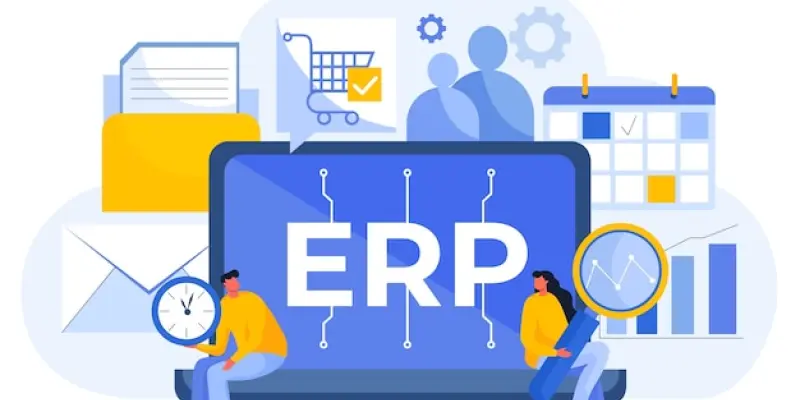In today’s rapidly evolving business environment, effective financial management is critical for any organization’s success. Traditional financial management systems, characterized by siloed data and manual processes, are increasingly inadequate to meet the complex demands of contemporary businesses. Consequently, companies are adopting modern ERP (Enterprise Resource Planning) systems to streamline their financial operations, optimize workflows, and drive sustainable growth. This article delves into the transformative impact of ERP systems on financial management and how these systems contribute to the overall success and growth of businesses.
Centralized Financial Data and Automation
A significant advantage of ERP systems is their ability to centralize financial data into a single, unified platform. In conventional systems, financial data often resides in separate silos, leading to inconsistencies, inaccuracies, and delays. With ERP systems, all financial information is consolidated, ensuring data accuracy and improving decision-making processes. As a result, centralization enhances transparency and accountability within the organization, fostering a culture of informed business decisions.
Automation of repetitive and time-consuming financial tasks is another key feature of ERP systems. Tasks such as invoicing, payroll processing, and financial reporting can be automated, reducing the manual workload on financial teams. This automation not only minimizes the risk of human errors but also ensures compliance with financial regulations. By alleviating the burden of manual tasks, ERP systems empower financial professionals to focus on more strategic activities, thereby contributing to greater overall business efficiency.
The benefits of automation in financial management extend beyond mere efficiency. By eliminating the human element in routine processes, ERP systems improve consistency and reliability in financial operations. This helps organizations meet audit requirements and maintain stringent internal controls, essential for long-term financial health. Moreover, automation can lead to cost savings by reducing the need for extensive manual labor and minimizing costly errors and discrepancies.
Real-Time Financial Reporting and Cash Flow Management
Another pivotal benefit of ERP systems is the provision of real-time financial reporting. With immediate access to up-to-date financial data, businesses can gain clear insights into their financial health at any given moment. Advanced reporting tools enable the generation of comprehensive reports on key financial metrics, such as profits, expenses, and cash flow. This capability facilitates informed decision-making by providing executives and managers with the data they need to make strategic choices swiftly. Moreover, real-time reporting allows for the early detection of potential financial issues, enabling proactive management before problems escalate.
Effective cash flow management is crucial for sustaining business growth, and ERP systems play a significant role in this domain. They assist businesses in tracking receivables and payables, ensuring timely payments, and maintaining adequate cash reserves. By offering detailed visibility into cash flow cycles, ERP systems help prevent liquidity problems and support effective cash management. This ensures operational stability, which is vital for both short-term and long-term business growth.
The real-time data provided by ERP systems also aids in forecasting and future planning. Businesses can leverage these insights to predict cash flow trends, allowing for better financial planning and allocation of resources. Enhanced cash flow management strengthens a company’s financial foundation, reducing the reliance on emergency funding and fostering a more stable and predictable financial environment.
Enhanced Financial Planning and Compliance
ERP systems are also valuable tools for financial planning and budgeting. They provide businesses with advanced forecasting and scenario analysis tools, streamlining budgeting processes. This allows organizations to allocate resources more efficiently, monitor performance, and adjust strategies as needed. By enabling detailed financial planning, ERP systems help businesses gain better control over their financial outcomes, contributing to long-term sustainability and growth.
Compliance and risk management are critical aspects of financial operations, and ERP systems help businesses manage these areas effectively. By automating regulatory reporting and ensuring accurate data collection, ERP systems reduce the risk of non-compliance with tax authorities and regulatory bodies. This not only minimizes the likelihood of penalties but also helps maintain the organization’s financial health and reputation. Enhanced compliance management ensures that businesses can navigate the complexities of regulatory requirements with greater ease and confidence.
Additionally, ERP systems equip organizations with robust risk management tools. These systems can identify potential financial risks and provide necessary alerts, helping businesses take preemptive measures. This proactive approach reduces exposure to financial threats and contributes to the overall resiliency of the business. By ensuring reliable compliance and mitigating risks, ERP systems safeguard companies against potential disruptions, securing a more stable and prosperous future.
Strategic Insights for Growth
In the fast-paced world of modern business, managing finances effectively is vital for an organization’s success. Traditional financial management systems, which often rely on isolated data and manual processes, no longer meet the complex needs of today’s businesses. As a result, many companies are turning to modern ERP (Enterprise Resource Planning) systems to enhance their financial operations, improve workflows, and support sustainable growth. ERP systems offer a comprehensive and integrated approach, helping businesses manage their resources more efficiently. This article explores the significant impact of ERP systems on financial management and examines how these systems contribute to the overall success and growth of businesses. ERP systems not only streamline financial processes but also provide real-time data and insights, allowing companies to make informed decisions quickly. By automating tasks, reducing errors, and facilitating better resource allocation, ERP systems play a critical role in driving organizational excellence and long-term prosperity.

